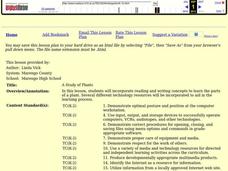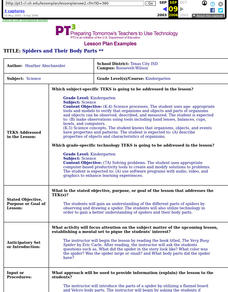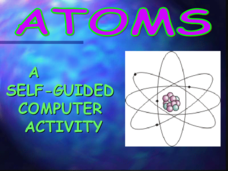Curated OER
Parts of a Plant
First graders discover the parts of a plant. In this science lesson, 1st graders identify and label the parts of a plant and record their findings on a word processor.
Texas State Energy Conservation Office
Are Your Computers Wasting Energy?
After reading about the amount of energy that is used to power a personal computer, learners take a look at their own computer use and therefore, their energy consumption. They do this through a series of questions and computations on...
Curated OER
A Study of Plants
Using a variety of multi-media resources, your high schoolers become familiar with the parts of plant and create a story about plants using vocabulary learned during their research of plants. Completed stories are published using the...
Curated OER
Parts of a Tree
Young scholars identify four parts of trees. In this plant biology instructional activity, students read the book Trees and conduct Internet research to identify the parts of the tree. Young scholars take notes from each website and...
Curated OER
Plant Parts
Second graders conduct research on plant parts. They listen to the book "Jack and the Beanstalk," explore various websites and read about plant parts, and create a movie using Kid Pix computer software.
Curated OER
Sea Horse Body Parts
Students complete a diagram of sea horse body parts. In this sea horse lesson, students review the story Sea Horses A True Book, complete a sea horse diagram using Internet sights to help, make new entries in their KWL charts and...
Chicago Botanic Garden
Preparing for Project BudBurst
Male deer growing antlers to begin the breeding season is an example of a phenological event. First in a four-part series is an activity requiring individuals to collect phenological data on their campus. Classes discuss phenology, the...
Curated OER
Computer Software and ACS Materials for Chemistry
Learners use computer software to simulate chemistry laboratory experiments. In this experimenting using computer software lesson plan, students use software called "The One Computer Classroom" to investigate wave simulations as a whole...
Curated OER
How Are Plants Similar And Different?
Studetns create an index card database of different categories of plants such as bushes, trees, flowers, grasses and vegetables. They review the different parts of a plant and label pictures of plants on the database cards. They use the...
Curated OER
Plants Scavenger Hunt Activity
The hunt is on! Provide young botanists with a list of eighteen plant-related questions and let them loose as they search for answers on corresponding fact cards. Perform this activity in the classroom or use it as an opportunity to take...
Institute of Electrical and Electronics Engineers
Arduino Blink Challenge
Emerging engineers read about Arduino software and how it can be used. Then they follow a nine-step tutorial to connect an Arduino board to a computer and put it to work! The objective is to code a program that will cause an LED to...
Curated OER
Eyes On Me
Students investigate the human eye. In this biology instructional activity, students read the book Look At Your Eyes and locate the various parts of their eye. Students play the game "I Spy."
Curated OER
An Introduction to Computer Components
Students experience the first lesson in computer servicing by observing computer components. They observe the internal workings of a computer during the lecture section of the lesson before dismantling a computer to identify its major...
Curated OER
Spiders and Their Body Parts
Students gain an understanding of the different parts of spiders by observing and drawing a spider. They utilize technology in order to gain a better understanding of spiders and their body parts.
Curated OER
Make a Model of a Tree
Students identify the parts of a tree. In this tree biology activity, students create a tree model using tree parts and drawing the roots. Students label each part of the tree and maintain a tree journal during this unit.
Curated OER
To Eat or Not to Eat?
Learners identify various parts of plants and determine which parts people eat. They conduct a celery stalk experiment in which they determine the value and use of the stem, and how it helps the plant to meet its needs. Students use a...
Acoustical Society of America
Musical Instruments Part I - Woodwinds
What is the connection between sound and vibration? Learners find out as they conduct a series of experiments with instruments they create. The experiment is well explained, includes modifications for visuall and hearing impaired...
Curated OER
Greenhouse Effect: A Computer Simulation
Students complete an online simulation of the greenhouse effect. In this lesson on the greenhouse effect, students use a website, similar to a webquest, to simulate and answer questions on how the greenhouse effect works. This lesson is...
Curated OER
Atoms : A Self Guided Computer Activity
"Self-guided Computer Activity" simply means that young chemists read through the slides and take notes about atoms along the way. There is an abundance of text on each slide, making this a comprehensive introduction to atomic structure....
NOAA
What's the Big Deal?
Who knew that a possible answer to Earth's energy resource problems was lurking deep beneath the ocean's surface? Part four of a six-part series introduces Earth Science pupils to methane hydrate, a waste product of methanogens. After...
Curated OER
Plant Parts with Sequencing Cube
Third graders listen to the story, Jack's Garden by Henry Cole. They learn the parts of the plant by looking at live plants.
National Nanotechnology Infrastructure Network
Small Scale Stenciling: Mask Lab
Investigate the procedure for developing computer chips! Learners use solar print paper to create both positive and negative images. They observe the effects of single and multiple exposures and compare results.
Chicago Botanic Garden
GEEBITT (Global Equilibrium Energy Balance Interactive TinkerToy)
Students use the GEEBITT excel model to explore how global average temperatures are affected by changes in our atmosphere in part two of this series of seven lessons. Working in groups, they discuss, analyze graphs, and enter data to...
Curated OER
Pen Pals
Learners make their own predictions about the amount of different types of birds at each site before they go there. In groups, they collect the bird data and compose letters to their pen pals sharing their information. To end the lesson,...























